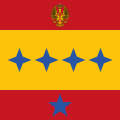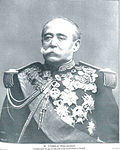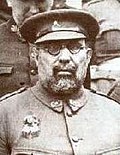| Chief of Staff of the Army | |
|---|---|
| Jefe de Estado Mayor del Ejército de Tierra | |
 Coat of Arms of the Office of the JEME | |
 Flag of the Chief of Staff of the Army | |
| Army Staff Ministry of Defence | |
| Style | The Most Excellent |
| Status | Highest-ranking officer in the Army |
| Abbreviation | JEME |
| Member of | Army Staff National Defence Council Council of Chiefs of Staff |
| Reports to | Minister of Defence |
| Seat | Buenavista Palace, Army Headquarters, Madrid |
| Nominator | Defence Minister After being discussed in the Council of Ministers |
| Appointer | Monarch Countersigned by the Defence Minister |
| Term length | No fixed term |
| Constituting instrument | Law of 17 July 1904 |
| Formation | 13 December 1904 |
| First holder | Camilo García de Polavieja |
| Deputy | Second Chief of Staff of the Army |
| Website | (in Spanish) Website of the Spanish Army Staff |
The Chief of Staff of the Army (JEME) is a military office held by a four-star general in the Spanish Army. Because of this, the JEME is the principal advisor to the Chief of the Defence Staff (JEMAD) on ground warfare and it is also an advisor to the Minister of Defence, the Secretary of State for Defence (SEDEF) and the Under-Secretary of Defence (SUBDEF).
Contents
Under the authority of the defence minister, the Chief of Staff of the Army exercises command over the land branch of the Armed Forces.
The JEME has two main roles: the support role by which advice is provided to the Minister of Defence about land military policy, the JEMAD about how to use the personnel and their operative status, the SEDEF about the economic, armament and infrastructure policies and the Under Secretary about the personnel and teaching policy, and the operative role to prepare the force for combat, instruct military personnel, establishes the organization of its military branch and watches over the welfare of the personnel under his command and evaluates the needs of the Army.
The Chief of the Staff of the Army convenes the meetings and coordinates the efforts of the Army Staff (EME), the main support body to the JEME responsible for providing the necessary elements of judgment to base its decisions, translate these into orders and ensure their fulfillment. The EME has a whole body of military officers at its service, and among the main officers include the Second Chief of Staff of the Army, the General Chief of the Terrestrial Headquarters of High Availability, the Chief of the Land Force and the General Chief of the Command of Personnel of the Army, among others.
The position was previously held by Army General Francisco Javier Varela Salas [1] and is currently held by General Amador Fernando Enseñat y Berea. [2]






















